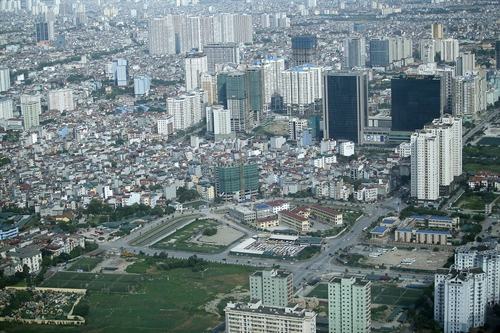 Society
Society

Hà Nội Municipal People’s Committee has decentralised power in granting construction permits, which is expected to help it better manage and curb violations in construction.
 |
| Hà Nội’s western area has seen a construction boom in the last decade. With newly-issued regulations on decentralisation in granting construction permits, Hà Nội wants to better manage and curb violations in construction. — VNS Photo Thái Hà |
HÀ NỘI — Hà Nội Municipal People’s Committee has decentralised power in granting construction permits, which is expected to help it better manage and curb violations in construction.
The city’s Construction Department, Industrial and Processing Zone Management Boards and People’s Committees at districts are empowered to grant construction permits.
Accordingly, the Construction Department decides to grant licences to buildings relating to religions, cultural/ historical relics, foreign direct investment or those located in at least two districts.
Buildings and large-sized posters in key streets including Hùng Vương, Hoàng Diệu, Nguyễn Tri Phương, Điện Biên Phủ, Trần Phú, Láng Hạ, Giảng Võ, Nguyễn Chí Thanh, Liễu Giai or Old Quarter also need approval from the Construction Department.
Industrial and Processing Zone Management Boards can grant licences for buildings that are located in the zones.
District People’s Committees are allowed to grant licences to houses, communes’ community centres and local relics.
Under the newly-issued decision by the municipal committee, responsibilities of relevant agencies in granting construction permits are also identified clearly.
For example, the city’s Planning and Architect Department is in charge in developing planning and designs, and providing them for the three empowered licence granters.
The Department of Natural Resources and Environment instructs licence applicants in proving lawful land-use rights or co-operates with relevant agencies to assess possible impacts of the buildings to the environment.
The Department of Agriculture and Rural Development provides the licence granting agencies about space that must be spared for dyke protection and flood water drainage.
Former director of the city’s Planning and Architect Department Đào Ngọc Nghiêm said that the decentralisation in granting construction licences and clearly-stated responsibilities of relevant agencies showed the city’s determination in administrative reform and fight against illegal buildings.
Nghiêm applauded the new policy allowing residents to build new houses with up to four storeys in areas where land-use planning was not approved.
“The policy would help residents improve living conditions,” Nghiêm said.
For years, people living in areas where projects are delayed or suspended are hardly able to build or fix their houses.
Nghiêm said decentralisation was also expected to help detect violations more easily and exactly. Any violations must be strictly punished.
Property expert Đặng Hùng Võ said that for years, shortcomings and non-transparency were revealed in granting construction permits in Hà Nội, causing ineffective construction management.
Võ said that 8B Lê Trực Building was typical for works that saw overlaps in granting construction licence and management.
“Decentralisation is meant to avoid overlapping. High-level agencies should do work on strategy, guidelines or design policies. Lower-level agencies would then take on implementation,” he said.
“Decentralisation will be effective if post-check or supervision is conducted strictly,” Võ said, calling for further supervision from municipal People’s Council in People’s Committee’s activities. — VNS




